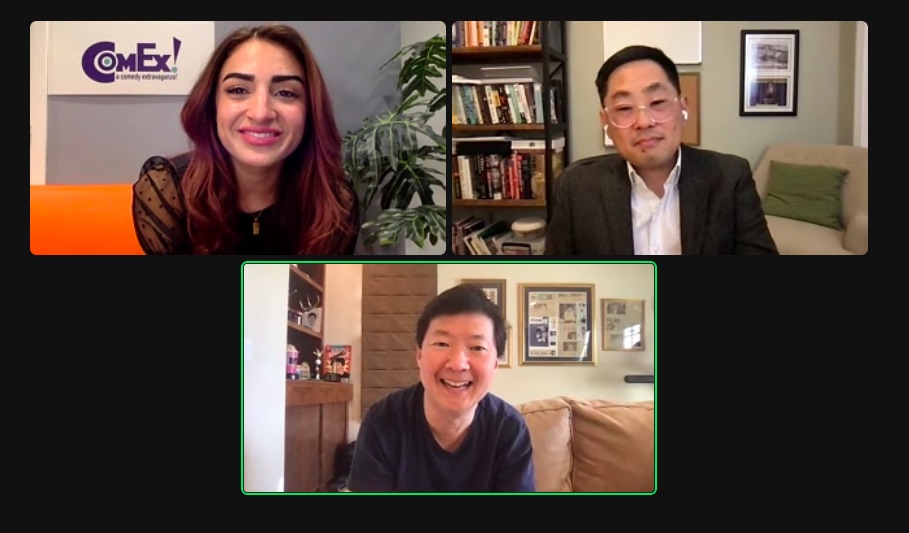ComEx!: Dr. Ken Jeong and the ‘Puzzle’ of Comedy

Comedian, actor, and producer Ken Jeong swung by the closing night of ComEx! on April 25 (by way of Zoom) to talk to the Emerson community about inclusion in Hollywood, keeping comedy relevant, and how improv is like medicine.
ComEx!, launched in 2019, is the Emerson Center for Comedic Arts’ annual three-day festival of all things funny. This year’s event featured performances from Emerson’s manifold sketch comedy and improv troupes, and standup comics, as well as the Jess Ilias Clavelli Comedy Award (the “Jess”) competition. This year’s winners were Cole Alberti ’23 (first place), Emily Hammond ’23 (second place), and Breanna Nesbeth ’24 (third place).
Jeong, who practiced medicine before becoming a stand-up comedian in the 1990s, has starred in numerous sitcoms and comedies, including Community, The Hangover franchise, and Crazy Rich Asians. He created his own autobiographical sitcom, Dr. Ken, which aired from 2015-2017, and currently can be seen in the limited series The Pentaverate. He was executive producer of the films Seoul Searching and Ktwon Cowboys, and is working with Assistant Professor Ed Lee to develop Becoming Eddie, a streaming series based on Lee’s film.
Lee moderated the discussion with Jeong, alongside student Isabella Bertram ’22. Here are a few of Jeong’s insights:
On the parallels between comedy and medicine
“I was in internal medicine, so I’m the first doctor you see. And it really is, for me, ‘educated improv,’ where an improv is all about listening. So, you listen to the patient and you learn about the patient, and based on what you know of medicine, at least if you don’t know what it is, you can point the patient in the right direction.
“And it’s the same in scene work, where, if you’re an actor, and let’s say you’re doing an improvisational scene, you’re listening to your scene partner. You may not know exactly where you’re going, it may not even be that comedic yet, but you’re trying to point the whole scene into a particular direction together. You’re ‘yes…and’-ing. And medicine in many ways, is the ultimate ‘yes…and.’”
On staying relevant
“If comedy’s like a puzzle, I wanted to be able to figure out the puzzle in 2022. To be frank, and I don’t want to throw anyone under the bus, I just don’t want to be one of those comedians that [say], ‘Oh, comedy was better in my day, and back in the day, you could do much more.’ That’s not right, that’s a false equivalency.
“Comedy is very much alive. I’m circling another project in a few weeks, and it’s with some of the best and brightest and funniest minds in comedy of all time. They’re way smarter and more sophisticated than I am, and I look forward to learning from them. So, comedy’s very much alive, you just have to look in the right places and you have to be in the right mindset.”
On the marketability (and power) of sharing inclusive stories
“I think, for me, the big watershed moment was Crazy Rich Asians. … Just being remotely any part of that movie was huge for me, because you saw the future now. Because it was a Hollywood studio movie, Warner Bros., with an all-Asian cast, and it was profitable. I think the budget was maybe, I don’t know, probably $30 million or so, but it made over $220 million worldwide. I mean, it showed that diversity and inclusion in our stories also can be blockbuster hits.
Even if it wasn’t a blockbuster hit … It launched careers like Awkwafina and Gemma Chan, and really galvanized, and if anything, made more iconic careers like Michelle Yeoh – all very powerful Asian women, and [they’re] role models that my daughters can look up to. So, it … definitely helped change my life and my perspective.”
On using influence to make change
“I think that in this business, if people don’t speak up, then – especially in my position – shame on them. When you’re starting out and when you’re just trying to establish yourself, it’s a different set of barometers and rules.
“Everyone has a different path to get there. I remember the director of Seoul Searching – it’s one of my favorite movies, I was also an EP on [it]…. The director, Benson Lee, told me, ‘It’s not how you get famous, as [it is] what you do with your fame once you get it.’ I think that’s something I live by.
So, I think just be yourself, and pay attention with your integrated self, and you will have the right answer for you.”
On dealing with rejection
“If you get a callback – they’re only going to call back maybe five or six people. And you never know, sometimes a role might be out to somebody famous and they’re just using this as a backup and you don’t know.
“I remember, I would always tell myself my whole goal when I was auditioning was to get that callback. Once I got the callback, however I did was beyond my control. … It’s like March Madness in college. If you make it to the Sweet 16, you’re good enough to win the championship. You’re good enough. You’re there.”
Categories